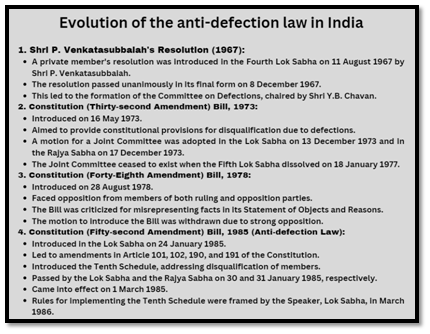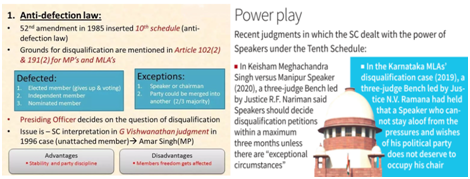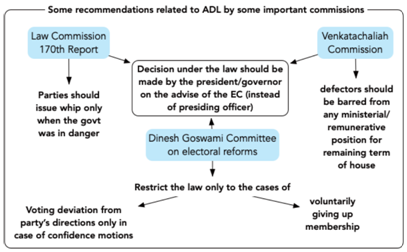CONTEXT:
The Supreme Court has ordered Maharashtra Speaker that proceedings to decide pending defection petitions in the Shiv Sena split case must be completed by December 31.
EVENTS THAT HAPPENED :
- In Maharashtra, 40 out of 55 Shiv Sena MLAs left the coalition government and formed a new coalition with the primary opposition party, the BJP.
- This resulted in a split in the Shiv Sena party, with both factions claiming to be the original Shiv Sena.
- The Election Commission disallowed both factions from using the name Shiv Sena and the original party’s symbol.
| Shiv Sena is a right-wing Marathi regionalist and Hindu ultranationalist political party in India founded in 1966 by Bal Thackeray. Shiv Sena’s election symbol is the Bow and Arrow. |
Related Issues with respect to defection law in Indian state politics:
- Goa (2022): Most INC MLAs joined BJP.
- Maharashtra (2022): Shiv Sena split, Election Commission intervened.
- Madhya Pradesh (2020): INC MLAs’ resignation led to BJP wins.
- Karnataka (2019): Disqualified rebel MLAs joined BJP, faced legal challenges.

Legal provisions regarding the disqualification of MPs/MLAs:
Disqualification of a lawmaker is prescribed in three situations.
- Articles 102(1) and 191(1)- for disqualification of a member of Parliament and a member of the Legislative Assembly respectively.
(The grounds here include holding an office of profit, being of unsound mind or insolvent or not having valid citizenship.)
- Tenth Schedule of the Constitution- This provides for the disqualification of the members on grounds of defection.
- The Representation of The People Act (RPA), 1951- This law provides for disqualification for conviction in criminal cases. (The government introduced the first RPA in 1950 in order to regulate elections in the country.)
| In 2016, the SC in the Nabam Rebia case had held that a Speaker or Deputy Speaker facing notice of removal cannot decide disqualification proceedings against legislators. |
Tenth Schedule of the Constitution- Anti-Defection Law:
The 10th Schedule of the Indian Constitution deals with anti-defection laws, which address disqualification of elected representatives for switching political parties.

Grounds for Defection:
- Voluntary Give Up:If an elected member voluntarily gives up his membership of a political party.
- Violation of Instructions:If he votes or abstains from voting in such House contrary to any direction issued by his political party or anyone authorized to do so, without obtaining prior permission.
- Elected Member:If any independently elected member joins any political party.
- Nominated Member: If any nominated member joins any political party after the expiry of six months.
Representation of the People Act (RPA), 1950:
- Section 8: Deals with disqualification for conviction of specific offenses. This includes crimes like promoting enmity between groups, bribery, and election-related offenses.
| Section 8(4) previously allowed convicted legislators to continue if they appealed within 3 months.In Lily Thomas’s case, Supreme Court, July 2013, declared 8(4) unconstitutional, disqualifying on the date of conviction. |
- Section 9: Covers disqualification for dismissal due to corruption or disloyalty.
- Section 9(A): Addresses disqualification related to government contracts and similar matters.
- Section 10: Focuses on disqualification for holding office in a government company.
- Section 10(A): Deals with disqualification for failing to report election expenses.
- Section 11: Discusses the removal or reduction of the period of disqualification.
- Section 11(A): Addresses disqualification stemming from conviction and corrupt practices.
- Section 11(B): Relates to the removal of disqualifications.
Conditions or legal steps that can potentially reverse the disqualification:
- Disqualification Reversal: Disqualification of a lawmaker can be undone if a higher court grants a stay on the conviction or decides the appeal in favor of the convicted lawmaker.
- Stay Clarification: In the 2018 ‘Lok Prahari v Union of India’ case, the Supreme Court clarified that disqualification doesn’t end immediately with a stay. The stay must not just suspend the sentence but also the conviction itself.
- Legal Provision: Section 389 of the CrPC allows an Appellate Court to suspend the sentence of a convict while the appeal is pending. This is similar to releasing the convict on bail.
RELATED CASES:
- Kihoto Hollohan versus Zachilhu case in 1993: decisions made by the presiding officer (typically the Speaker) in anti-defection cases are not final and can be challenged in court.
- Lily Thomas MLA Disqualification (2013)– Supreme Court struck down Section 8(4) of the RPA as unconstitutional.
COMMITTEES RELATED TO ANTI-DEFECTION:
- B. Chavan Committee (1967) on anti-defection:
Key recommendations:
- Code of Conduct: Create rules for political parties to follow, especially regarding defections. Representatives from parties should make these rules.
- Only Member Ministers: Ministers and Chief Ministers should be members of the lower House (like Lok Sabha) to prevent defections. This might need a Constitutional change but won’t affect current officeholders.
- Bar Defectors: Lawmakers who switch parties should be banned from certain roles (Minister, Speaker, etc.) for one year or until they get re-elected. This rule applies to positions funded by the government.
- Dinesh Goswami Committee Report (1990) on anti-defection:
Key recommendations:
- Presiding Officer’s Role: Speaker should decide on defections only after a proper inquiry, within three months. This decision could be reviewed by the courts, making the process fairer.
- Exceptions for Splits: if one-third of party members formed a new group, it shouldn’t be seen as defection. This allowed for genuine factional changes.
- Exemption for Mergers: Mergers of parties, supported by at least two-thirds of the original party, should not be considered defections.
- Election Commission’s Role: The Election Commission should get involved in split and merger disputes to ensure fairness.
- Hashim Abdul Halim committee report (1994) on anti-defection:
Key recommendations:
- Judicial Review: If someone disagrees with the Presiding Officer’s decision, they can appeal to either the Supreme Court or the High Court, depending on the situation.
- Presidential Review: In the Lok Sabha, an appeal can be made to the President. In the Rajya Sabha, appeals can be made jointly to the President and the Vice-President.
- In-House Review: A committee of senior members of the House can decide on the case, and if needed, there can be an appeal to the Presiding Officer.
- 255th report of the Law Commission of India (2015):
Key recommendations:
- Issue with Legal Challenges: The Law Commission noted that legal challenges against decisions made by Speakers on disqualification harm people’s trust in the Speaker’s role.
- New Decision-Makers: Power to decide on disqualifications due to defection should be shifted from the Speaker to the President (for Members of Parliament) or the Governor (for Members of Legislative Assemblies).
- Advice from Election Commission: decisions based on the advice provided by the Election Commission of India.
Over the years the law has been examined by various committees and several recommendations have been given in their reports e.g. 170th report of the Law Commission of India (1999), Report of the National Commission to review the working of the Constitution of India (2002), Hashim Abdul Halim committee report (2003) and 255th report of the Law Commission of India (2015).

ARGUMENTS IN FAVOUR AND AGAINST ANTI-DEFECTION:
In Favor:
- Party Loyalty: The law encourages politicians to stay loyal to their party, which is important for political stability.
- Accountability: It ensures that politicians are accountable to the party’s promises and the people who voted for them.
- Two-Party System: It discourages the rise of too many small parties, making governance more stable.
- Prevents Corruption: It deters unethical practices like buying or forcing politicians to switch parties.
- Clear Rules: The law has clear disqualification rules, making it easy to enforce.
Against:
- Limits Freedom: The law can restrict politicians’ freedom to vote as they wish, even when they disagree with their party.
- Blind Loyalty: It can promote blind loyalty to party leaders, hindering independent thinking.
- Inflexible: The law doesn’t adapt well to changing political situations.
- Uneven Application: It’s not applied consistently and can be selective, leading to accusations of bias.
- Party Centralization: It may concentrate power in the hands of party leaders, limiting democracy’s diversity.
What can be done to make anti defection law effective?
To make the Anti-Defection Law work better, government should consider several measures which include:
- Focused Application of the Law:
The law should only be used for important votes that can affect the government’s stability, like passing the budget or no-confidence motions.
- Decision by President or Governor:
Instead of letting the Speaker decide, it’s proposed that the President (for MPs) or the Governor (for MLAs) should make the decision with advice from the Election Commission. This reduces bias.
- Independent Authority:
To ensure fair decisions, some say the Speaker, who relies on majority support, may not be impartial. An independent authority should handle these decisions.
International Experience:
- Legislators Defecting Parties: In most advanced democracies, legislators can switch their political party affiliation without automatic disqualification from their positions.
- Internal Party Discipline: When legislators defect, they may face consequences within their party, such as expulsion from the party. In some cases, the seating arrangement of a legislator changing their party allegiance may be modified within the legislative body.
- Disqualification for Party Switching: In five countries – Bangladesh, Guyana, Pakistan, Sierra Leone, and Zimbabwe – lawmakers can be disqualified from their positions if they change their political allegiances or vote against their party’s positions.
- Specific Cases in Pakistan: In Pakistan, disqualification for voting against party lines only occurs in certain situations. These include:
- Election of the Prime Minister or Chief Minister.
- Votes of confidence or no-confidence.
- Voting on money Bills or constitution amendment Bills.
